I: Prelude of the Queen
Chapter I: Prelude of the Queen
[She] trusted to have equalled the Most High,
If [she] opposed, and with ambitious aim
Against the throne and monarchy of God,
Raised impious war in Heaven and battle proud,
With vain attempt. [Her] the Almighty Power
Hurled headlong flaming from th' ethereal sky,
With hideous ruin and combustion, down
To bottomless perdition, there to dwell
In adamantine chains and penal fire,
Who durst defy th' Omnipotent to arms.
This day has been just perfect...
A perfect day was perhaps too much for her to ask for. Indeed, perhaps too much for anypony to ask for; but for a moment though, she had thought it was hers; had tasted it on her lips, savoured it, and found its flavours intoxicating, irresistible even.
Power, no, success was so much of the perfection that was so nearly hers. Imagine: to look in the face of a living goddess; to bring her to battle; to succeed!- and then to rise ascendant as even divinity lay prostrate before her. She, triumphant against even the sun itself,- how that onrush of feeling,- joy, it must have been joy,- made her feel positively light-headed! How exhilarating! How magnificent! She could have laughed, danced on her hooves, even sung... wait, she did sing, now that she thought about it. A silly little tune it was, but if nothing else a momentary monument to how singularly happy she had been.
Everything had been going according to plan.
Everything had been
perfect.
Now it seemed such a hollow thing to her as she streaked across the Equestrian skies: a black meteor shooting uncontrollably through the air, propelled by the sheer force of the magical barrier that the two royal lovers had created back at the castle.
There was something poetic about the matter perhaps; something out of a fairytale, where love is the truest and most powerful of all forces, and creatures,- no, monsters, as ponies were wont to think of her and her kind,- such as herself were justly punished for their desires, their ambitions, their sins against a fairer, infinitely gentler world.
She could just imagine how safe, how wonderfully ignorant the ponies of Equestria were of how cruel the world truly was. They did not need to strive for survival, not battle with the harshness of a barren land to live and see the sunrise of another day. After all, they lived in this green paradise, protected by a pair of immortals who could move both sun and moon;- what need was there for them to know of strife and struggle?
How untouched seemed the dream that was Equestria! Ever-rolling green, the hills and forests richly verdant spread; the cloud-capped peaks that burst from vale and valley to kiss high heaven the all-embracing blue; the wild plains and pastures tamed, the fields that unfolded towards an unending horizon. Even now as she hurtled through the air, she could discern small hamlets and larger towns that slumbered amongst the quiet but unequalled beauty Nature blent.
How different it was from her home and the land of her birth! Those barren wastes were perpetually warm, painted in rich colours, endless variations of red, orange and brown. A land of autumn hue, but infinitely less forgiving,- of a different Nature, red in tooth and claw;- red were the cliffs, the scars, the sands that rose and rolled in waves, the dunes of still fire; crags gave way to fathomless deep ravines, dark basins untouched by light; and there, glimmering like some strange mirage, the emerald-black domes of her hive.
As the image of her home came to her mind, she recalled the words her mother once said to her when she was still very young, together gazing at the setting sun many, many years ago. From the balcony of the royal chambers it had glowed as like a red pearl, staining the sky a deep rose, warm red, blood-red shade.
'Sol solus est invictus,' her mother had murmured, weariness echoing from every word. Her eyes had turned to her daughter, who seemed not to understand. Tenderness bloomed in those eyes and she gently pressed her cheek to her daughter's in a slow, affectionate nuzzle. It was only many years later that Chrysalis learned what those words meant.
The sun alone is unconquerable...
She could feel the bitter taste of bile rise in the back of her throat. How she wanted to sink her teeth deep into something. She wanted to bite, to tear, to break; to make something else suffer as she knew herself to be suffering at that moment.
It would not have been the first time her rage would be quenched by violence. When she had been preparing her invasion, an idiotic Ursa Minor had blundered into her territory, causing chaos and costing her precious changeling drones that were needed to conquer the Equestrian capital, until it had been subdued. Surveying the damage, thinking of all the careful preparation that had been ruined by the wretched creature, she had allowed her anger to master her.
The sharp metallic scent of blood, the fading warmth as she dug her teeth ruthlessly and relentlessly into the soft flesh beneath the tough hide and muscles;- she had torn out the heart from the dead thing and trampled it beneath her hooves. She had returned to her quarters bathed in blood, gore clinging stickily to her soaked form, dripping from her muzzle. The taste had been repulsive; the mess thereafter even more so, but at least the fires of her fury had been sated.
Now she felt the same as then, save that there was nothing for her to direct her rage against. She had already given up screaming: her throat was too painful for her to make any more that the barest whisper of a word, having already spent the earlier part of her journey voicing,- shrieking, screeching, screaming,- her impotent rage, her sheer disbelief at the sudden turn of events, for all of the Equestrian skies to hear.
Stern is the light of Celestia’s grace, and unequally given;
all things are equal beneath Luna’s compassionate eyes.
Pointless, ancient, stupid, stupid verse. This part of her mind,- or was it simply her unacknowledged heart?- sang an eternal rebel strain, the counterpoint to the chorus of her being and opposed in every part to what was truly her. It was sentimental, forgiving, guilt-ridden, uncertain, stupid, and utterly weak. This was the part of her that would recall tender memories of her mother and the old stories that she had been told of; that would sing its silly little ditties when she was happy; that stopped her from simply killing Mi Amore Cadenza, the Bearers of Harmony, even Celestia, when she had them captured and powerless, completely and entirely at her mercy.
This was the part of her she always fought to keep suppressed, to lock away deep in her mind, for it always betrayed her,- betrayed the Chrysalis that was the Queen of the Changelings, the Chrysalis that knew no weakness, that was all powerful. This was the traitorous part of her that still found beauty at the sight of Equestria passing beneath her and would spout lines from poems and songs even as she hurtled through the air. Was it Equemachus or Prancilian that wrote the couplet? A pre-Nightmare poet either way.
How stupid.
Now that same weak part of her had voice to further wonder: had some pony, some other pompous ignoramus of a poetic nature seen her, might they have written similar lines about her unwilling flight? Ballads and epics had been written about Nightmare Moon's banishment after all, and they were still being circulated today. Would they not do the same for her?
Perhaps they would have compared her to a falling angel, or else some counterpart to it. Unseen by night, the gleaming gloss of her dark carapace indistinguishable from the black tapestry of the night sky, save where a star would be obscured by her passage. Else they might instead have named her a star, that gave no light but was instead was an absence thereof, unique amongst all the celestial bodies, expressing only a quiet splendour even in descent. If singular, then she would have been a precious thing; something to be cherished; indeed, something beautiful.
...There, she lowers to meet eternity;
soft is the end to her,- still is the night
that seems unmoved by her mortality,
or loss the memory of her absent light.
Where other stars gleam as blossoms in bloom,
she only fades;- but in her lonesome fall
seems to glimmer brightest in the even gloom;
sole and untouched, the loveliest of all...
Or perhaps they would have named her a dark goddess or some doomsday herald of a higher power. A wrathful seraphim perhaps; the thunder of her hooves and the cruel peal of her laughter would echo endlessly across the vast expanse of the world. So eager would she be to reach fair Equestria below, so eager to exact her vengeful justice, that the line of white vapour that now scored the sky behind her was but an ever-growing trail of smoke and ash and flame; the air around her ignited by the fury of her flight. At distance only dim radiance might be seen perhaps, but then something would come roaring into the earth a thousand times more fierce than a falling sun and infinitely more terrible than even an oncoming night eternal.
None would be able to stand before her. Once the dust had cleared and the last tremors of the final conflict ceased, only she would remain. Standing over the glorious ruin of her foes, she would sit enthroned the monarch of all: eminent, unbowed, supreme.
In her secret, most unacknowledged heart, the voice she scorned for its weakness, she preferred to be the softly shimmering star. She that was the queen thought only of the vengeful, unconquerable being and revelled in that dream of victory, of absolute power.
Perfect...
That word now only rang a hollow note in her mind, equal much a hollow note in her chest. How had things turned out so wrong? She had been all but victorious. Shining Armor was completely under her control. Princess Celestia was imprisoned in a Changeling cocoon. The six Bearers of Harmony had been captured and prevented from reaching their Elements. Everything had been per- ...had been just where she wanted.
What had gone wrong?
Had there been some other power at work, something entirely beyond her control? Did the goddess of the sun have some other power that she had chosen not to reveal during their fight? Was the royal couple to blame, the bride using some secret Equestrian magic redirect the groom's love into a weapon of some kind? Or had the whole invasion been doomed from the start? Had she been...wrong?
No, no, never. She would not, could not admit fault; at least, not any fault of hers. She was a queen, a monarch whose will should never have been denied. Such was the dignity of her office, the prerogative of that which made her her. All that she surveyed was but an extension of her thoughts and her desires. Nothing was beyond her grasp and all things ought to have subjected themselves to her or else have been destroyed. That was the true nature of the world, she insisted. It must be so.
This was her pride speaking, though she would never have doubted it as any but the voice of her true self. She was defeated, yes, but her spirit remained unbroken. She may have lost her victory, lost all the love and power that the rich prize of Equestria might have brought to her and her swarm, but she was still a queen and in her own mind an equal, nay, a superior to the rulers of ponykind, if not all things that crawled or swam or flew.
She would concede nothing less to herself.
Only, as the words rang in her head, there seemed to echo back some answer from an unbidden inner voice. Was it doubt? Was it the hollow note of her pride? Only, the words it murmured back seemed to bury themselves deeper into her mind, and clutch at her heart.
...'T is fortune. All that is fortune, must as vanity fade...
...And where are they that strove, that were before you?...
...Vain are your works, ye once-were mighty. Look on them and despair!...
...And what's become of all the gold that used hang and brush your bosom?...
Shut up, she hissed harshly in her mind; refusing to acknowledge the voice of her doubting heart, traitor of her thoughts and dreams. Her weakness was embodied in that voice, and she despised it. It was not her that had failed! No, no. It was somepony else that had failed her and her perf- her plan. Some unseen variable that had ruined things for her. That had to be it. Perhaps it was some weak link in her swarm, some wretch, some worm that had betrayed her to the Equestrian princess.
Her swarm... In the rush of her flight, and her screams of vengeance, and her unspent rage, she had forgotten about her swarm, forgotten about her children.
She was their queen after all, and what monarch could truly ever ignore the voice of her people and subjects, muted though they always were by the hive-mind that defined Changeling society? She could hear them now, muddied waters in her mind that echoed only the confusion and desperation. So many disparate voices, thoughts and emotions: most were simply lost, scared and confused, begging for her guidance and direction. These were fortunate and fortunately many, and she felt comforted to a degree by their safety,- relieved even.
'Flee,' she commanded through her link to the Changeling hive-mind, 'flee, my children. Canterlot has been lost. Return to the hive.'
There was still confusion,- bewilderment,- at her words, she could sense, but there was a change in general cacophony of voice and emotion. Relief and certainty replaced a myriad of conflicting emotions, and then she felt them act. Those who could were escaping to the wastelands that held the sanctuary of her home and the majority of the Changeling race.
Only... as the voices of those who could respond grew distant and dim, others made themselves heard. These could not respond to her commands; only sing of their suffering, grow desperate, and despair. Even though so many were safe or fleeing into safety, the thoughts and voices of those unfortunate few overwhelmed her. Again and again they called to her, as though in one voice, crying out the suffering and pain of a multitude; and then the rest was silence. Each echoed in her mind with that same swansong, and to her inner heart only accusation seemed.
How was she to answer them, they who were suffering, they who were to die?
Again, she warred with herself. Indifference, wrath, or pity? One part of her to say: blind yourself to the sorrows and the travails of those who were only born to serve. Their cares are not your own; their suffering not your own and never meant to be. They are baser creatures, made of ruder materials and undeserving of your attention, let alone your pity. Let them be.
Now the wrathful queen, vitriolic in her vengeful spite: they suffer because they are weak. It was their weakness after all that caused you to fail. Their suffering is just. Let them feel pain; theirs is no equal to your own for being denied what is rightfully due you. They are cowards and weaklings all, whereas you,- you are a queen. They deserve it all, if not more.
Only her secret heart protested the rest, and silently wept as she felt her children die. Only in her inmost heart did her tears come; her face was dry, would still be barren of tears even if the air that rushed past her not whipped them away. She would not cry. She refused herself the luxury of them. They were for others; not for a queen, and not for her.
Uneasy lies the head that wears the crown,
and in the dust lie triumphs o'erthrown,
of all my vaunted race, as well mine own...
A bird callously thrown out of a window could still right itself with enough time and height. A griffon leaping off a cliff could spread its broad wings to catch the upwards rushing air and speed away in that magnificent motion of flight. At the speed that she was flying, any attempt to correct her trajectory with her insect-like wings would only tear them off, the soft membrane far too delicate to withstand the winds and to arrest her fall.
Most of her Changelings seemed to have ceased their forced flight; but not her. She had been practically next to Shining Armor and Mi Amore Cadenza when the shield had exploded outwards, and though her greater size might have afforded her greater resistance to the blast, the effect was barely felt as she was catapulted from one of the pearl-white towers of Canterlot.
...Fair Ponyville beneath it lies
and far o'er in the eastern skies,
the rays of Celestia's sun doth rise
and lights upon with splendid eyes
the many towers of Canterlot.
Tall spires girdled round in white
and walls that gleam with inward light;
seem wreathed in richness ever-bright
that dream of Canterlot...
Stupid. Stupid. Stupid. Still with the verse; still with the utterly asinine observations of how beautiful things seemed from where she was. Was it any wonder why she despised that part of her own weak heart?
It is strange, that time within the mind may pass at a different rate to reality. In joy and occupation, time moves faster than the mind perceives it, one hour's entertainment easily being stretched into several hours without one being aware of it. At other times, the opposite proves the case; in boredom, time slows to an impossible rate; in stress, a lifetime may be compressed into the barest of an instance. How long had she been flying? How long had it been? Had hours passed or merely minutes?
Ah... she could tell the direction of her flight had changed entirely now. She was falling, but gathering speed. She could tell that the ground, once so distant, was now much much nearer. Green still, not the dusty brown of her homeland. The clouds now floated far above her, whereas the first part of her flight left a Chrysalis-shaped hole in several cheerfully fluffy clouds. The trees were now better defined, the vast sea of green now breaking into subtle nuances and variations in tone and hue, tint and shade.
Those were tilled fields that she could see. Now, more colours. The brightly painted roofs of a hamlet nearby; the soft blue of a lake that she knew was too far to the right for her to land in. She tried to spread her wings, but found she could not; the winds were pressing them tight to her body and denied her their use. She tried to call up her magic, but her horn only sputtered and dimmed; her magic disrupted by the spell that had sent her flying to begin with. She flailed her legs, twisted and turned; anything to regain control and prevent the inevitable. All for nothing.
It seemed a voice,- her voice perhaps,- now murmured a weary sentiment to her. To cease her struggle and for things to end; to forget her ruin, her loss, her final fall from grace. Submit to the end of her forced journey through the skies that would doubtless be her end as well.
...Surely, surely, slumber is more sweet than toil...
...Release me, and restore me to the ground...
...I earth in earth, only...
...Let me alone...
For want of tears before the end, or even to have died in battle with the Princess of the Sun. A dignified death, not to be turned to Changeling paste when she crashed into foreign soil. She closed her eyes; shut out the colours; shut out the sight of the ground coming closer and closer; and tried to picture herself elsewhere. A futile effort. She could not help notice the way the wind rushed past her. She tucked her legs into her body. She knew it would hurt; she knew she was going to die, and she found herself terribly afraid.
Sudden pain.
Silence.

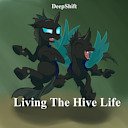

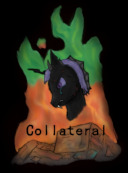
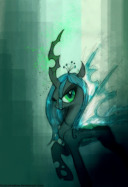



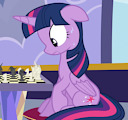


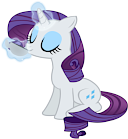
Hmmm...
2102021
Hmm?
2102111
Hmmm...
Seriously, you write well. However. I cannot even imagine Chryssie not caring taht her subjects were dieing, it goes against everything we know about her.
"And as Queen of the Changelings, it is up to me to find food for my subjects." -Chrysalis
2102236
Of course she cares about her subjects, and I do realize that, but I was aiming for a more conflicted portrayal of her.
Having read a lot of angsty Celestia fics, I've wondered how one might reconcile the different roles and façades that people have to adopt with how they actually feel. A monarch that invades another nation of sentient beings would appear ruthless, cruel and power-mongering. A mother doing her utmost to feed her children on the other hand is something that evokes pity and sympathy.
Also, while I do realize feeding her Changelings is a major part of her characterization, she also seems to enjoy herself a little too much when she appears to have won:
'Everypony I'll soon control / Every stallion, mare and foal / Who says a girl can't really have it all?'
Considering these words, I always thought the emphasis lay on personal power rather than the power/welfare of her hive as a whole, something a bit more like a 17th-Century European monarch rather than the head of a more representative government or a loving matriarch. Trying to balance these out is why I've approached her characterization the way I have.
I've tried to show that she does care, but if it doesn't show quite enough, then please tell me, and I'll edit it accordingly. :)
2102498 Yes, she did enjoy herself a lot, but I actually thought the emphasis was on her people. After all, if she'd wanted to rule Equestria since she was just a filly (larva?), she'd have to have a good reason.
Yes, she did enjoy herself a lot, but I actually thought the emphasis was on her people. After all, if she'd wanted to rule Equestria since she was just a filly (larva?), she'd have to have a good reason.
2102847
True, true. I'll see how the plot develops and try to work her in a bit more faithfully. Thanks for the fave, btw. Made my day :)
2103041 No problem.
No problem.
Owch.
What's a passacaglia?
2264889
Old Baroque musical form, that develops variations based on a fixed basso continuo.
2274549
Oh OK thank you
2274559
This story's going to be a little mix of musical 'ideas' and poetry a little, so the choice of a passacaglia as the title of the story will hopefully have a little significance to it.
Ready for more
Good so far, can't wait for more. I noticed a few spelling errors and such and wondered; do you have a proofreader yet?
I noticed a few spelling errors and such and wondered; do you have a proofreader yet?
4140738 No, no. Although I'm a little wary the idea of having one as I've been slower than continental drift with the writing, mostly as this is my final year in university, and because I deliberately use archaic words/conjugations/expressions, which might be a little confusing for an editor whose not used to it.
Also, I use British spelling as well, and I've had it pointed out to me before (not on Fimfiction, yet) that I've supposedly misspelled words such as 'colour' for 'color'.
Any mistakes that stick out glaringly in the first chapter? I greatly appreciate any and all constructive input.
4142745 Not all that much. I did notice a missing space between a period and the next word. I was just wondering if you did.
You wrote this very well, and your use of archaic style is interesting, though I can't place it precisely in time. More importantly, I think, it suggests Chrysalis has a 19th-century mindset. But you undercut this by returning repeatedly to the idea that she has a sentimental side which she is ashamed of.
There are many different and opposing 19th-century mindsets, but few or none having this combination of glorifying power and conquest and rejecting sentimentality. The 19th century was the Romantic age, and violence was associated with and perpetrated either by Romantics who embraced sentimentality, e.g., Napoleon, Marxists, anarchists, nationalists, racists, colonialists, and missionaries, or by realpolitik manipulators like Bismarck. Chrissy here seems to be neither of these.
Romantics had absolute certainty in the rightness of their cause, and relied on whipping up sentimentality to promote the violence they wanted. Same story with the Nazis and with Muslim terrorists; see Thomas Hegghammer's "Why Terrorists Weep" on why they're so sentimental. Violent ideologies are nearly always, maybe always, sentimental. They don't reject sentimentality as weak; they appropriate it, by linking it to Nation, Race, God, the Great Leader, the People, Justice, or other ideal Platonic types.
The idea that one should not be sentimental comes from Plato, and you might look to his writings, e.g., The Republic, for an example of someone who wanted to be both unsentimental and totalitarian--but even he (and the Christians, who followed him) merely displaced his sentimentality onto his imagined transcendental world.
8856842
Now this is a comment I can appreciate, I must say.
I very much agree with your analysis of the role of sentimentality in Romanticism and later 20th century forms of authoritarianism - and the article was very interesting to read, by the way, so many thanks for that :)
Romanticism, especially in its 19th century iterations in England and Germany,- and I'm thinking of Carlyle here,- conceived of the world according to 'great man theory', that the actions and temperament of notable individuals decide the course of history. In addition, drawing from the political writings of transitional (late Enlightenment to early Romanticism) writers like Hegel,- especially his theories on the relationship between individuals and the state,- and it becomes a fairly small step to see how Romantic ideologies can sanction both the sentimentality of extraordinary individuals, i.e. the artist, the dictator, the poet, etc. and the construction of authoritarian systems that would otherwise suppress these.
The part where you hit most home in your review, I think, when you observe that
If I may speak honestly, I hadn't intended to make her a dictator/manipulator of a Romantic mould, the kind that uses and revels in their own emotional states as a means of aggrandising themselves and controlling a populace or 'other'. I would be more hesitant, but not reluctant, to read her as a character of the Romantic tradition, more because I would consider a changeling monarch to more closely echo the earlier tenets of the Age of Absolutism. The need for persuasion and coercion is lessened due to the inherent auctoritas of the monarch, who in turn may or may not be the most appropriate individual to fulfill the socio-political role of the monarch, whereas the Romantic great man would be the most capable of wielding the power of their own personality to shape that role and the world around them to suit their needs.
While the role of the monarch is essential to the socio-political life in an Early Modern absolutist system, we frequently see how not all individuals born into the role are well-suited for it. Additionally, there is a problem of interpreting what Absolutism actually means in real terms for the individuals involved who must resolve the question: what is the actual role of the monarch in relation to the state and society? You can see at least three iterations of this in the period: Prussia conceives of the monarch as an Enlightened philosopher king and the first servant of the state; French and Russian Absolutism emphasise the totality of monarchical power; and English Absolutism ultimately remakes itself under the Hanoverians as an equal component of a mixed government.
The relevance of this to Chrysalis is that her conception of the role of the monarch and her idea of the best individual to fulfill that role quite clearly does not map particularly well onto her own personality. You are absolutely right in saying she is neither Napoleon nor Bismarck, and she doesn't really aim to be like them either. Instead, she strongly believes in the image of a ruthless absolute monarch, i.e. 'the wrathful queen' and believes that she should be that. Unfortunately (for her), that is not a hat that she herself is, at least in the chapter above, much capable of filling.
I think what you point out actually hints at a greater weakness of this chapter, actually. I've set a great deal up, but nothing has been at all concluded really, meaning that what one gets is, at most, an impression of what her character is, rather than seeing how it fares in discourse with other individuals. Heavens, I really do need to write more for this.